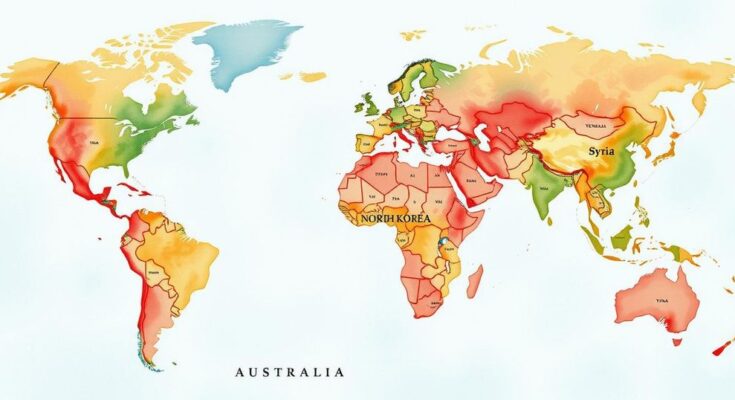Australia has issued “Do Not Travel” warnings for ten countries, including Russia and North Korea, due to escalating threats related to armed conflict and civil unrest. These warnings halt tourism activity, ground flights, and jeopardize economic recovery efforts linked to foreign visitors. The advisories underscore the fragile nature of global tourism amidst ongoing geopolitical crises.
The Australian Government has issued “Do Not Travel” warnings for ten nations: Russia, North Korea, Venezuela, Haiti, Iran, Myanmar, Sudan, Syria, Ukraine, and Libya. These advisories are due to escalating threats including armed conflict, terrorism, civil unrest, and arbitrary detention. As a result, the warnings jeopardize any potential for tourism recovery in these regions and signal significant safety concerns for travelers.
In Russia, the government urges Australians to evacuate urgently due to risks like arbitrary detention and increased hostility towards foreigners. Terrorism threats and active military zones further exacerbate the dangers, effectively crippling tourist activities and inviting heightened scrutiny of foreign visitors.
North Korea has maintained stringent travel restrictions with completely closed borders and suspended tours. The state-controlled tourism sector has virtually ceased to exist, indicating no anticipated return of foreign tourism in the near future.
Venezuela remains marred by chaos, characterized by rampant violent crime and severe shortages of necessities. The unpredictable security situation and frequent violent demonstrations render travel unsafe and unmanageable, further straining tourism infrastructure.
Currently, Haiti is in a State of Emergency due to rampant gang violence, affecting critical transportation routes. Major airlines have suspended operations, leading to frozen tourism with evacuation prioritized above all else.
In Iran, existing tensions stem from the potential for military strikes and deteriorating security. Unpredictable demonstrations and the risk of terrorism have made travel perilous, forcing a halt to the previously expanding cultural tourism sector.
The ongoing conflict and civil unrest in Myanmar recommend that Australians avoid travel. Following the military coup in 2021, tourist numbers have plummeted amid a highly volatile atmosphere.
Rapid escalation of violence in Sudan has led to an advisory for Australians to leave immediately. Although there are limited commercial departures available, they carry significant risk, and tourism is non-existent due to ongoing civil conflict.
Syria is deemed one of the globe’s most dangerous locales, where civilian casualties are rampant amid ongoing bombings and terrorist activity. All travel to Syria is highly discouraged as the tourism infrastructure lies either destroyed or tightly restricted.
Ukraine, experiencing heavy fighting and missile attacks, is classified as a high-risk zone. The presence of landmines and a highly volatile security situation has led to a total cessation of tourism.
In Libya, ongoing armed conflict and terrorism offer one of the most complex travel scenarios. Australians are advised to leave if safe, as consular support is extremely limited and tourism remains entirely shut down amid the unrest.
Overall, these ten nations illustrate a broader trend indicating that geopolitical crises are profoundly impacting international tourism patterns. As travel insurance in these areas often becomes void and consular assistance is minimal, adventurous or humanitarian travel is strongly discouraged. Consequently, Australia’s advisory signals a complete halt to tourism activities in these countries, grounding flights, suspending tours, and severely impeding recovery efforts.
The Australian Government’s sweeping travel warnings underscore the fragility of the global tourism landscape. As crises deepen, the prospect of returning to safe, responsible tourism in these areas remains uncertain, leaving both travelers and local communities in an ambiguous state.
Australia’s recent “Do Not Travel” warnings highlight the severe risks posed by geopolitical instability in ten nations. The advisories not only signify immediate dangers for travelers, including arbitrary detention and escalating violence, but also indicate a broader trend affecting global tourism. With tourism infrastructure halted and consular support lacking, the possibility for recovery in these regions appears remote, leaving both tourists and local communities in a precarious situation.
Original Source: www.travelandtourworld.com




